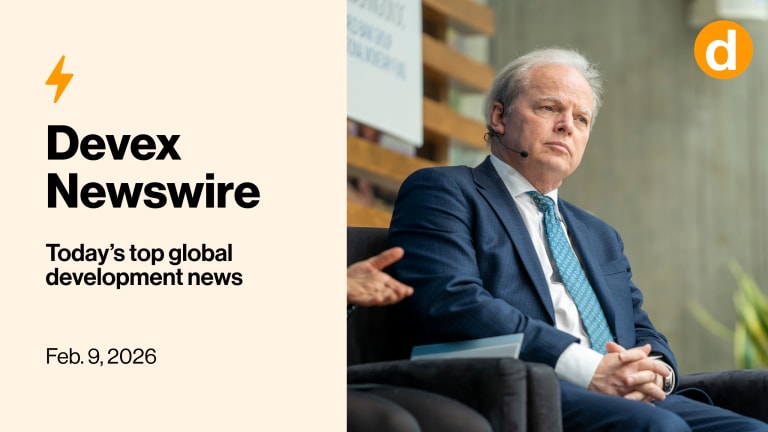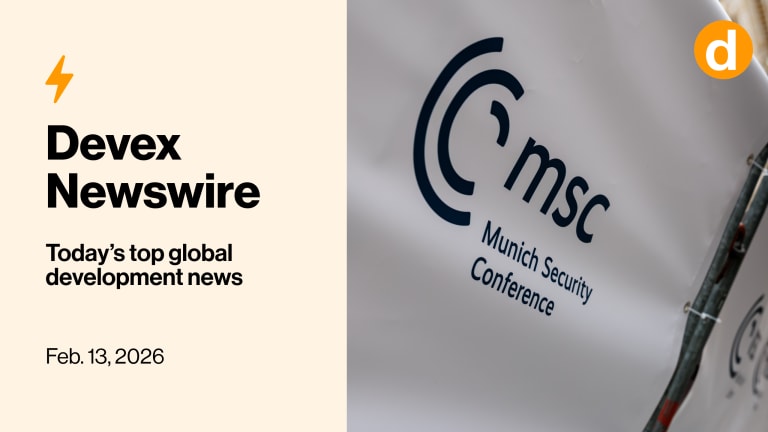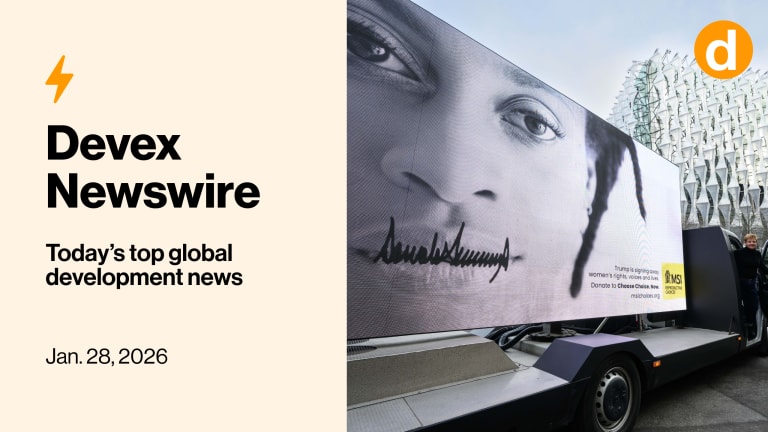Devex Newswire: Multifaceted outlook for multilateral development banks

Today for Devex Pro Week, we focus on two major multilateral development banks — the U.S.-based World Bank and the China-based Asian Infrastructure Investment Bank — for a temperature check on their distinct yet intersecting journeys.
Also in today’s edition: The World Health Organization is letting hundreds of people go.
+ Join us tomorrow, Aug. 27, for a Devex Pro Briefing that will ask: With major powers cutting aid spending, what should replace it? We’ll discuss if the official development assistance model is in decline, explore other development tools, and debate if it's worth persuading donors in the global north to increase aid spending. Save your spot now. This event is part of Pro Week.
Too slow?
The World Bank has almost become synonymous with reforms in recent years. It’s been under intense pressure to undertake them to better respond to today’s crises, and its president, Ajay Banga, has promised to do just that.
The road from promises to reality can be a long one, though.
Years of debate over how multilateral development banks must respond to global challenges “has led to a shared set of objectives,” Nancy Lee, a senior policy fellow at the Center for Global Development, tells my colleague Adva Saldinger. “I don’t think you can say, however, that the implementation has progressed as fast as it should.”
There has been visible movement, especially when it comes to growing the balance sheets, as the World Bank found ways to stretch existing funds and deploy innovative financing tools. It’s also tried to reduce red tape and accelerate project timelines. Indeed, project approval time had dropped to 13 months from 19 months as of June, with some projects moving in under a month.
However, many experts argue that the bank remains too slow and risk-averse.
“Development is risky and complicated. Mistakes are going to happen,” says Chris Humphrey of ODI Global think tank, adding that if the bank is structured to avoid every potential misstep, it won’t get anything done, and countries will turn elsewhere for financing.
Has this risk-aversion bled into politics, with the World Bank highlighting and de-emphasizing certain priorities to avoid alienating U.S. President Donald Trump? Some say so, pointing to how the bank has oriented itself around job creation while going noticeably silent on climate. That marks a sharp shift from its original evolution road map, which promised to expand the bank’s mission beyond extreme poverty to tackle challenges such as climate change.
“We are incredibly far away from that moment we were in of the evolution road map,” says Clemence Landers, a senior policy fellow at CGD. “On a lot of things, the bank has sort of gone into stealth mode.”
Stealth or not, the World Bank will continue to be in the spotlight as people demand more change, and the 81-year-old institution tries to keep up.
Read: In a changing world, where do World Bank reforms stand? (Pro)
+ If you're not a Pro member yet, we’re offering a rare $100 off an annual membership to celebrate Pro Week. Sign up now to access all the special content and events this week and for the rest of the year.
Too fast?
If the World Bank is accused of being too slow, the Asian Infrastructure Investment Bank, in contrast, is noted for its speed. However, it has also been accused of being too fast. (I am starting to sense a Goldilocks theme here.)
The Beijing-based AIIB, which recently turned 10, was launched with a bold vision: to be faster, leaner, and more efficient than the lumbering MDBs that have long dominated global finance, my colleague Jesse Chase-Lubitz writes. But has speed meant sacrificing standards and accountability? Its critics — and AIIB has its fair share of them — say so.
“There’s a lot of rhetoric surrounding high social and environmental standards, but the practice and implementation is substandard and lacking, to say the least,” one former AIIB official tells Jesse.
At the same time, AIIB has had its fair share of praise.
“You also see some real innovations in the AIIB” when it comes to implementing MDB reforms, Kevin Gallagher of Boston University says, noting that the bank is optimizing its balance sheet and working efficiently.
“They’ve come up with some of the more innovative approaches at the right time,” Gallagher adds. “They’ve sort of left the nest.”
Left the nest it certainly has: The bank now has 326 projects and approved spending of over $60 billion under its belt. It has also built its shareholder base up from 57 in 2016 to 110 in 2025, including Western countries that were skeptical of the institution at its inception.
Indeed, when AIIB was born, it immediately put Western countries on alert.
“From the beginning, the United States didn’t like countries joining forces with China to establish this new institution,” says Jing Qian of New York University in Shanghai.
Fears that China would try to establish its own parallel global finance framework have largely dissipated. But jitters linger that countries will abandon the bigger, older banks in favor of the AIIB because they can get funding faster with less bureaucracy.
“The AIIB is a really interesting institution because it really didn’t turn out to be what the real naysayers at the start said it would be,” says CGD’s Landers. “It turned out to be a truly multilateral institution by virtue of its shareholding.”
Read more: AIIB turns 10 — is there trouble ahead for the China-backed bank? (Pro)
Background reading: AIIB's 10th anniversary — where is the money going? (Pro)
ABCs of MDBs
With a call to increase their lending capacities, the largest MDBs are ramping up efforts to reach $300 billion to $400 billion in lending headroom. But which exactly are those MDBs, and how much do they lend?
Alecsondra Kieren Si crunched the data into a downloadable report that not only offers a picture of the big MDBs, but also many smaller regional development banks. Understanding that picture is all the more critical nowadays as donors pull back on aid funding and MDBs are being called upon to step into the fray.
Here’s a sampling of what she found:
• The African Development Bank, or AfDB, has 81 shareholder countries, 54 of which are African countries.
• AfDB has almost doubled its approvals over the past few years. In 2024, approvals reached almost $10 billion in loans, guarantees, and equities, compared to just $5.1 billion in 2020.
• The Asian Development Bank, or ADB, is owned by 69 members, 50 of which are from the Asia-Pacific region.
• Excluding grants, ADB committed $22.1 billion in 2024, which is a slight dip from 2023’s $22.7 billion.
Download the report: A deep dive into the world’s biggest MDBs
WHO no
600
—That’s how many people are losing their jobs in Geneva as part of a budget-cutting push by the World Health Organization, according to a letter sent to staff by WHO Director-General Tedros Adhanom Ghebreyesus that was seen by Devex.
“With a 21% reduction in the 2026–2027 budget, we are now realigning our structures with our core mandate,” Tedros wrote, outlining WHO’s ongoing restructuring in response to donor funding cuts. “Some activities are being sunset, others are being scaled down, and those most directly linked to our mission are being maintained. At headquarters, based on the final approved structures, we anticipate approximately 600 separations.”
Understandably, the restructuring has created considerable anxiety among staff, with some questioning the fairness of the process, my colleague Jenny Lei Ravelo reports. In recent weeks, some staff told her how chaotic things have been as WHO finalizes its restructuring. And some expressed fears that more job cuts may be coming.
In December 2024, WHO employed a total of 9,463 staffers globally, and 2,611 of them were at the headquarters in Geneva.
“I do not pretend this is easy. It is painful,” Tedros wrote. “But with your dedication and courage, I believe we will emerge as a WHO that is not only leaner, but also stronger, more sustainable, and more independent — so we can keep delivering on our shared mission: health for all.”
Read: WHO anticipates losing some 600 staff in Geneva
In other news
Botswana President Duma Boko declared a public health emergency on Monday as the country runs out of medical supplies and equipment, a crisis worsened by U.S. aid cuts. [BBC]
U.N. chief António Guterres condemned Monday’s Israeli airstrikes that hit the Nasser Hospital in Gaza, killing at least 20 people, including five journalists. [Xinhua]
The U.N. Security Council has postponed a vote, originally scheduled for Monday, on whether to extend the mandate of the U.N. peacekeeping force in Lebanon for another year amid U.S. and Israeli objections. [France 24]
Sign up to Newswire for an inside look at the biggest stories in global development.
Search for articles
Most Read
- 1
- 2
- 3
- 4
- 5








